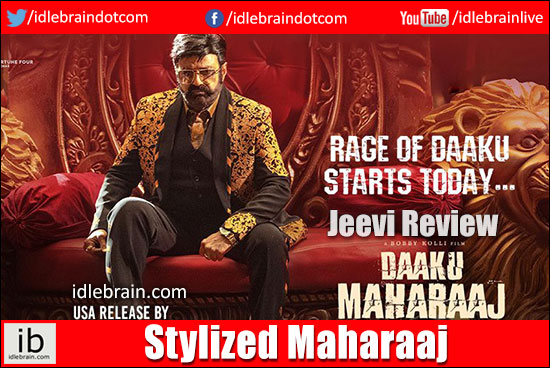|
|
Story
A young girl named Vaishnavi faces a grave threat to her life. She is the granddaughter of a wealthy tea plantation and educational institution owner (Sachin Khedekar). A family servant reaches out to Nanaji (Balakrishna Nandamuri) for help. As Nanaji steps in to protect Vaishnavi and her family, it becomes clear that the danger is tied to a deeper story involving his past. The narrative unfolds as the histories of two individuals (NBK and Bobby Deol) intertwine in an unexpected way. The rest of the story reveals Nanaji's connection to Vaishnavi and how he eliminates the looming threat.
Artists Performance
Nandamuri Balakrishna shines in this mass action film, delivering a stylish performance. His character has three distinct shades, and he portrays each one flawlessly. The film includes a few of his signature dialogues that delight his fans. Known for his trust in directors, Balakrishna doesn’t shy away from breaking traditional formats to explore something new. Notably, he deserves praise for avoiding duets, ensuring the flow and mood of the film remain intact. He skillfully underplays his role when required, showcasing his versatility as an actor.
Others: Bobby Deol delivers a solid performance as a ruthless villain exploiting the Chambal valley for his gain, making others suffer for his profit. Pragya Jaiswal plays a significant role in the film and does justice to it. Shraddha Srinath surprises with her choice of a pivotal role, which she performs admirably. Urvashi Rautela appears in an extended cameo as a cop and shines in a special song. With the primary heroines taking on character-driven roles, there's less scope for glamorous portrayals by other female characters. Chandini Chowdary is decent, while Shine Tom Chacko portrays a helpless cop adequately. Ravi Kishan impresses with a substantial role, and Sachin Khedekar delivers a fine performance. Makarand Deshpande, Divi Vadthya, and Ravi Kale stand out as members of Daaku Maharaaj’s team. Director Sandeep Raj, stepping into a negative role, excels in his performance. The child actress who portrayed Vaishnavi delivered an adorably charming performance.
Story - screenplay - direction: The story of the film leans on a formulaic structure but gains freshness with a unique backdrop - a tea plantation hill station in South India for one segment and the Chambal Valley for the flashback. The director ensures the female characters contribute meaningfully to the narrative (with Urvashi Rautela being an exception). He also brings in a skilled cinematographer to deliver stylish visuals and avoids unnecessary comedy and romance, which often disrupt the flow of such films. These efforts inject some novelty into the otherwise predictable story, leading to partial success for director Bobby Kolli.
The interval scene stands out, featuring an impactful face-off between the hero and the villain, depicted with striking fire (hero) and ice (villain) visuals. The first half of the film is fairly engaging, but the second half, dominated by flashback episodes in the arid Chambal Valley, loses some emotional resonance. The passive tone of Daaku Maharaaj’s character in this section makes it harder to stay emotionally invested, despite strong elevation scenes for the hero.
The climax follows a routine pattern, and Ravi Kishan addressing the hero as "annayya" comes off as unintentionally comical. However, the scene where Vaishnavi walks back into danger and NBK appears to save her is well-conceived and reused effectively during the climax for a stronger payoff. Bobby Kolli succeeds in presenting NBK in a fresh and stylish avatar, adding a new dimension to the actor's persona.
Other departments: The film boasts two standout technical highlights: music and cinematography. Thaman’s background score deserves special recognition, with the repetitive use of the signature Daaku rage tune never feeling tiresome. The song Dabidi Dibidi is particularly entertaining on screen, serving as the film’s primary source of fun. Vijay Kartik Kannan, known for his work in Jailer, delivers exceptional cinematography, showcasing the hill stations, Chambal, and Rajasthan in a highly stylish manner. The sandstorm sequence is especially well-executed. The action sequences are brilliantly crafted.
Editing by Niranjan Devaramane and Ruben is sharp and keeps the narrative tight. The dialogues are effectively written, and Avinash Kolla’s production design enhances the visual appeal. The choice of locations is impeccable, adding authenticity to the story. The production values, backed by the Sithara Entertainments banner, are lavish and contribute significantly to the film's grandeur.
Analysis: Daaku Maharaaj features three distinct shades of NBK’s character, and he delivers one of his most stylish performances to date. While the first half of the film is engaging, the second half, set against the arid backdrop of Chambal and centered on a more subdued conflict, struggles to create a strong emotional connection with the lead characters. Overall, Daaku Maharaaj is a stylish action entertainer that serves as a visual treat for fans.
|

